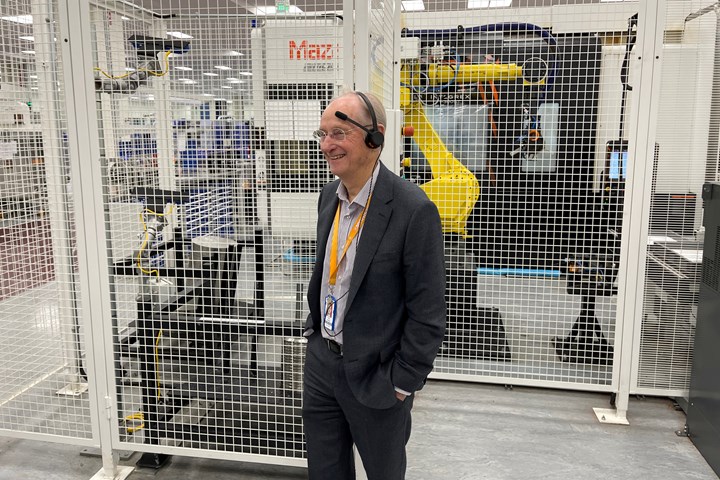The Link Between CNC Process Control and Powertrain Warranties
Ever since inventing the touch-trigger probe in 1972, Sir David McMurtry and his company Renishaw have been focused on achieving process control over its own manufacturing operations. That journey has had sweeping consequences for manufacturing at large.
Share






ECi Software Solutions, Inc.
Featured Content
View More
Hwacheon Machinery America, Inc.
Featured Content
View More


During a brief period in the mid-1960s, the Big Three automakers — locked in fierce competition — extended their engine and powertrain warranties to a then-unheard-of five years or 50,000 miles. It proved to be a reckless decision. Within just a few years, consumer claims on these warranties were so overwhelming and expensive that the automakers reverted to one-year warranties by the early 1970s.
Today, five-year powertrain warranties are nearly standard, with some automakers bumping that coverage up to 10 years or 100,000 miles. What has changed between then and now, of course, is that automotive manufacturers have achieved higher levels of accuracy in their design and manufacturing. Precision-manufactured parts are now achievable at scale, and product performance, efficiency and reliability all have increased because of it.
This month’s cover features the original 1972 touch-trigger probe invented by Sir David McMurtry and patented by Rolls-Royce, where McMurtry worked as a young deputy chief designer. Known for his keen analytical mind and problem-solving skills, McMurtry was tasked with addressing a problem the company was having with measuring the instrumentation pipe of a Concord jet engine.
The probe that Rolls-Royce used at the time was rigid and kept pushing the part away each time it made contact. After studying the issue, McMurtry designed and built the first touch-trigger probe over the course of a weekend using a lathe that he kept in his garage. Soon after, McMurtry and his then-colleague at Rolls-Royce, John Deer, quit Rolls-Royce and went on to form the company Renishaw in 1973. McMurtry was able to buy the patent from Rolls-Royce (the original U.S. patent is featured as the background of our cover image), and the probe served as Renishaw’s central focus during the company’s early days.
McMurtry (often referred to as “Sir David” after he was knighted by the Queen several years ago), still serves as chairman and chief executive at Renishaw. McMurtry has been quoted as saying that most cars and aircraft that exist in the world today have at least one component that has been measured by a Renishaw probe. It is a claim that, given the ubiquity of the product at manufacturing facilities around the globe, hardly feels like an exaggeration.
Sir David McMurtry photographed on the shop floor at Renishaw's Stonehouse production facility in March of 2023. Photo Credit: Modern Machine Shop
As this publication has documented many times over the years, Renishaw has been relentless in its pursuit of achieving process control over its own high-mix, low-volume manufacturing operations, turning to its own production facilities in the United Kingdom as proving grounds for new innovations. The company’s system for machine-level process control, called RAMTIC (Renishaw’s Automated Milling, Turning and Inspection Center), has served as the foundation of its production methodology since the 1990s.
Earlier this year, on the occasion of the company’s 50th anniversary, I had the chance to visit those production facilities in the U.K. Besides the anniversary, the core reason for the visit was to learn about a development in Renishaw’s quest for end-to-end process control — a new manufacturing connectivity and data platform called Renishaw Central. The platform, which you can read about here, leverages data from connected shopfloor devices such as Equator gaging systems, machine tools, CMMs, tool setters and machine tool probing systems. Using its own Intelligent Process Control (IPC) software, the system can detect the presence of tool wear and send tool offsets to the machine tool CNC in real time.
During my time visiting Renishaw’s production facilities in England and Wales, the evolution of the company’s own production strategies was often referred to as a “journey.” Whether or not the touch-trigger probe can be considered a form of automation may be debatable, but from the moment of the probe’s invention to the implementation of RAMITC, to the release of Renishaw Central, identifying and controlling variation in its production processes has been a mission of Renishaw since its inception. And so you can, at least in part, thank Renishaw and other OEMs on similar missions for the 10-year/100,000-mile powertrain warranty.
As for automation? On one afternoon tour of Renishaw’s Stonehouse plant, I found myself walking side-by-side with Sir David after the two of us had broken off from the group to look at one of the automation cells on the shop floor. Passing by a row of Mazak Integrex machines running unattended, I asked McMurtry: “What is going through your mind as you walk through this plant, 50 years after starting the company?” He thought for a second then pointed up to the line of Mazaks and said, “As long as the lights are green, I’m happy.”
Related Content
The Many Ways of Measuring Thickness
While it may seem to be a straightforward check, there are many approaches to measuring thickness that are determined by the requirements of the part.
Read More4 Ways to Establish Machine Accuracy
Understanding all the things that contribute to a machine’s full potential accuracy will inform what to prioritize when fine-tuning the machine.
Read MoreOrthopedic Event Discusses Manufacturing Strategies
At the seminar, representatives from multiple companies discussed strategies for making orthopedic devices accurately and efficiently.
Read MoreTurning Fixed-Body Plug Gages Inside Out
Fixed-body mechanical plug gages provide fast, high-performance measurement for tight-tolerance holes.
Read MoreRead Next
5 Rules of Thumb for Buying CNC Machine Tools
Use these tips to carefully plan your machine tool purchases and to avoid regretting your decision later.
Read MoreRegistration Now Open for the Precision Machining Technology Show (PMTS) 2025
The precision machining industry’s premier event returns to Cleveland, OH, April 1-3.
Read MoreBuilding Out a Foundation for Student Machinists
Autodesk and Haas have teamed up to produce an introductory course for students that covers the basics of CAD, CAM and CNC while providing them with a portfolio part.
Read More






.png;maxWidth=150)









































